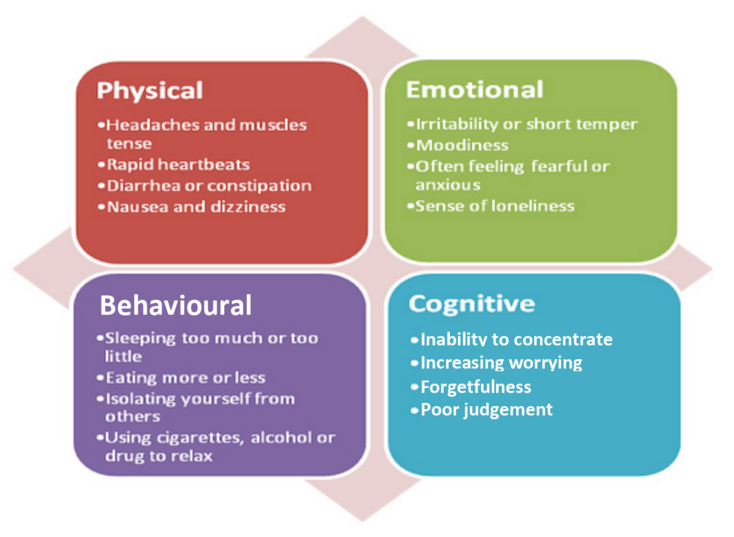Stress is a normal body response to an increase in physical or emotional demands in life. Modern life is full of deadlines, frustrations and demands. For many people, stress is so ordinary that it has become part of life. Stress is not always bad because the stress response is the body’s form of protection. A moderate amount of stress helps you to stay focused and motivated, as well as improves your performance. However, if stress is too intense or is experienced continuously over a long period of time, there can be harmful impacts to the mind and body. Prolonged exposure to stress without managing it well may increase the chances of developing medical conditions such as high blood pressure, heart problems, depression, anxiety or other mental health conditions.
What are some of the causes of stress?
Stress is commonly related to negative causes, such as unemployment or an exhausting work schedule. But in fact, any event that puts high demands or forces adjustment can be stressful. This includes positive events like pregnancy or marriage.
Common causes of stress
- Financial difficulties or debts
- New job or unemployment
- Marriage or divorce
- Death of loved ones
- Accidents
- Illness
What are some of the common signs of having stress?
Stress can present in numerous ways, such as emotional, behavioral, physical and cognitive symptoms.
The following table lists some of the common warning signs and symptoms of stress.

What can I do to manage stress?
- Practice relaxation techniques regularly
- Controlled breathing: Close your eyes and concentrate on your breathing. Take a slow deep breath in through your nose for 3 seconds, and then breathe out through your mouth for 3 seconds. Think the word ‘relax’ as you breathe out. Clear your mind and think only about slow, deep breathing. Imagine the tension flowing out of your body each time you breathe out.
- Progressive muscle relaxation: First, close your eyes and focus on your body. Relax each muscle group from your feet and move up to your body. Tense the muscle as you breathe in, and then relax as you breathe out. Allow 15-20 seconds between each muscle group. Keep your mind focused on each muscle group while you are working on it.
- Visualization: Close your eyes and imagine a soothing, peaceful scene (e.g. a quiet place in a garden). Then, see yourself there, relaxed, peaceful and happy.
- Mindfulness
- You may feel like stress in your life is out of your control, but you can always control the way you respond to it. You must control your mind instead of letting your mind control you. Learn to be in control of what thoughts you pay attention to and to focus on the current situation rather than the past or future. Sometimes just realizing that there are some things in life that you cannot control frees your mind from stressing over it.
- Engage in daily physical exercises
- Physical exercises help to relax tense muscles and reduce the level of stress hormones. Exercise at a moderate level for at least 30 minutes on all or most days of the week. Any type of regular exercise is beneficial.
- Plan your time well and be realistic
- Organize your time. Make a ‘to do’ list and prioritize daily tasks. Plan in advance and do not leave things to the last minute. Set a realistic goal or achievement for yourself so that you won’t feel discouraged or frustrated. Reward yourself with little things that you enjoy (e.g. a massage or a movie). Balance work and play time. Make time for hobbies. These will relax your mind and are good escapes from worries. Learn to say no to jobs that put you under too much pressure.
- Maintain a healthy diet and sleep pattern
- Eat healthy and well-balanced diets regularly, including plenty of fruits, vegetables and grains. Limit food intake of high in fat, sugar and salt. Drink at least 2 litres (8 glasses) of water daily unless advised otherwise. Try to get six to eight hours of sleep every night. Sufficient sleep can allow you to stay focused better, be more productive and deal with stressful conditions more efficiently.
Reference
- Stress Management. (n.d.). Retrieved from https://www.heart.org/en/healthy-living/healthy-lifestyle/stress-management.
- Tips for Coping with Stress|Publications|Violence Prevention|Injury Center|CDC. (2019, September 3). Retrieved from https://www.cdc.gov/violenceprevention/suicide/copingwith-stresstips.html.
- Stress Management Center: Reducing Stress, Stress Symptoms, Causes, Treatments, and Relief. (n.d.). Retrieved from https://www.webmd.com/balance/stress-management/default.htm.










